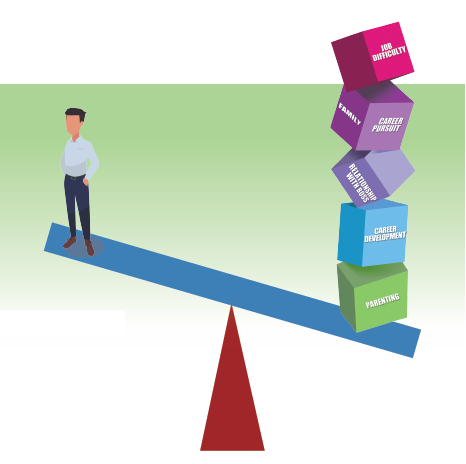Stigma lifted on dealing with workplace stress
Courses help employees cope with mental health issues, assist colleagues


Gao Dongzhi is in the business of dealing with complaints, mostly from agitated people demanding a refund.
He heads the air ticket service team at a Shanghai-based online travel agency. Every day, dozens of employees on his team answer phone calls from customers around the world. The nature of the work means the people they are dealing with are rarely calm.
In late May, Gao participated in a course about mental health in the workplace. The intention of the course, jointly provided by the Shanghai Mental Health Center, or SMHC, and the Shanghai Pilot Health Promotion Center, or SPHPC, was to empower participants to help themselves and those around them deal with mental stress at work.
Gao said that by studying the basics of mental health and self-help methods for groups and individuals, he had mastered some emotional management skills, allowing him to assist stressed co-workers.
Since November, the courses have been provided four times for nearly 300 participants, including doctors, corporate managers, and human resources specialists. The courses will be expanded to more districts in the city, the organizers said.
"Under the current context of VUCA (volatility, uncertainty, complexity and ambiguity), how to improve the psychological resilience of employees to adapt to the changing social development and organizational changes of enterprises are what enterprises and individuals are concerned about," said Si Xinli, executive director of SPHPC.
Si said small investments in workers' mental health and emotional management are of great value, "as they can bring happiness and productivity, and will contribute to an encouraging business environment."
He Yuan, vice-chairwoman of the Shanghai Medical Trade Union, was one of the course participants. She said as industries and life move ahead at a fast pace, it is important to help healthcare workers master the knowledge and skills to cope with job stress and perform "psychological first aid".
"Many people run about between work and their family day after day, leaving little time for themselves. As they are the backbone of society and the pillar of their families, it will be good for their families and all of society if they have the right mental state," she said.
The course lecturers, mostly clinical doctors from mental health hospitals, used real cases during the classes. Participants were asked to use what they had learned to spot potential psychological challenges for co-workers who may be in a similar situation, and devise ways to talk to them and ease their concerns.
"The first step is to identify stress in the person," said Zeng Qingzhi, one of the lecturers and a doctor specializing in public health from SMHC.
"There are stress signals from various systems of the human body, as well as signals from emotions, interpersonal relationships, and behaviors.
"For example, typical signals include stopping taking good care of oneself, a lack of concentration, holding a persistently negative attitude toward themselves and their surroundings, insomnia, relying on alcohol and smoking more often than usual, and withdrawal from the company of family, friends, and colleagues," she said.
Burnout, you know it
Li Li, deputy head of the Psychological Health Promotion Department at SMHC, said work burnout usually begins when a person sees no meaning in their job anymore, it seems overly demanding, or they feel they are not being properly rewarded.
"When a person enters a condition of burnout, it's like a phone needs to be charged as soon as possible. When someone is in a state of 'power emergency' for a long time, it may pose various physical and mental health risks," she said.
However, unlike physical health problems, mental health ones usually take longer to recover from, and have a heavier impact on the people involved and their families, said Si, the executive director of SPHPC.
"If someone has a broken leg, they can still type with their hands and they can still think and express themselves. But if they are confronted with a serious mental challenge, such as depression, it may not allow them to work," he said.
Citing British studies, Zeng said that more than half of employees around the world do not tell their bosses they feel overstressed, and one in four of those who quit say it is because they can't cope with the pressure at work.
Globally, anxiety and depression affect 300 million and 280 million people respectively, according to World Health Organization data. Nearly $1 trillion is lost every year due to the reduced productivity of workers afflicted by depression and anxiety, research conducted by WHO experts showed.
"A certain level of pressure functions as a propeller to move forward life and work," said Zeng.
"People usually take the initiative to cope with such pressure, and will be at the peak of efficiency and perform well. But if stress continues to rise, some may start to behave in a sluggish way, make more mistakes, and feel fatigue, exhaustion and even collapse."
Zeng added that instead of dodging stress, it's important to make it manageable.
























